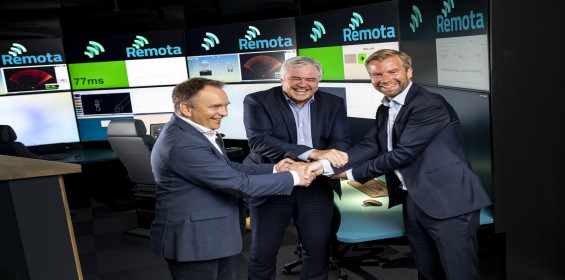Remote operations venture
Published: 15 June, 2022
Solstad Offshore, DeepOcean Group and Østensjø Group have joined forces to fast-track the adoption of remotely managed services in order to drive down operating costs and emissions for the marine and offshore industries.
The three partners have established two joint ventures (JVs) to support the remote operations drive. One of the JVs, named Remota AS, will own and operate advanced onshore Remote Operations Centers, while the other JV will develop, own and operate unmanned surface vehicles (USVs).
“Solstad, DeepOcean and Østensjø already have the technologies, competence and assets in place, but teaming up will further enhance the capacity, growth prospects and market penetration of our remote operations offering. Operators of offshore energy assets have challenged the supplier industry to deliver even more cost-efficient services. This is our response,” says Lars Peder Solstad, CEO of Solstad Offshore.
The new partnership aims to challenge the offshore energy industry needs in terms of efficiency and enables a sustainable green energy transition. The first Remote Operations Center is fully operational, and with the addition of USVs the partnership has big advantages both on the cost and emissions side.
“Remote operations are key to unlocking huge emission reductions and cost savings from the marine and offshore industries. The new joint ventures aim to fast-track the adoption of new remote technologies, which in turn will make ocean-based industries even more sustainable,” says Håvard Framnes, investment director of Østensjø.
The three partners will each own 33.33% in the two JVs that will own and operate the Remote Operations Centers and the USVs.
The JV that owns the Remote Operations Centre is called Remota AS and will be lead by Sveinung Soma.
“With our unique Remote Operations Centre and the backing of three leading international supplier companies, we believe that Remota can offer customers a world leading remote offering for marine and subsea operations. I genuinely believe it can transform how traditional ocean-based industries approach their offshore work,” says Sveinung Soma, CEO of Remota.
Remota will offer remote operations and semi-autonomous maritime services to existing vessels, remote operations of remotely operated vehicles (ROVs) and USVs. In addition, the company’s first Remote Operations Centre will function as a control centre for drone technologies.
Today the centre operates DeepOcean’s ROVs from Haugesund, Norway, and has been in operation since 2019. The Remote Operations Centre has already remotely managed a significant amount of ROV operations in European waters, supporting clients with subsea installations in addition toinspection, maintenance and repair (IMR) campaigns.
“This is about taking the current experience, track record and technology and bring it to a bigger scale, thereby making it a more powerful offering to the ocean-based industries. Remota will have operations and turnover from day one, and we will immediately double the support capacity at the Remote Operations Center in Haugesund,” says Øyvind Mikaelsen, CEO of DeepOcean.
The centre will operate independently of its three owners and offer its services to all operators, vessel owners and service companies worldwide. The center will initially offer its services to offshore shipping companies and ROV-operators but aims to expand its service offering to other industries as well.
In addition to the Remote Operations Centre, the three companies will establish USV AS, a separate company for investing in USVs equipped with an WROV (Work-Class ROV) onboard. This type of vessel is capable of considerably reducing operating expenses compared to conventional vessels that are utilised for subsea inspection, maintenance and repair work.
The concept of unmanned vessels contributes to all aspects of sustainable maritime operations and can be one way of fast-tracking the green transition within the industry. By enabling more efficient operations, slower sailing speeds and significantly reduced operating costs, it is not only sustainable in terms of reduced environmental footprint, but also in economic and social terms.
The USV technology has been developed by JV-partner DeepOcean, and the two other partners have been involved in the final stage of the development. It is estimated that the USV solution can reduce CO2-emissions by more than 90% compared to a conventional offshore vessel when conducting subsea operations.
“By introducing USVs, we are moving the captain onshore who will remain in control over the offshore operations. This is an excellent way of reducing cost and the CO2 footprint. By limiting personnel exposure to offshore operations, this also introduces a brand new safety aspect. It also represents a significant business potential for the JV,” adds Øyvind Mikaelsen of DeepOcean.

From left to right: Håvard Framnes, Østensjø: Øyvind Mikaelsen, DeepOcean; and Frank Ramstad, Solstad Offshore.





